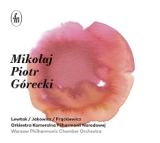Kantige Rhythmen, eine dichte Klangsprache und schwebende Töne – so könnte man die Musik von Mikolaj Pjotr Gorecki kurz umschreiben. Es sind dies drei wesentliche Elemente, die in den sehr unterschiedlichen Werken dieses Albums wiederholt auftauchen.
Gleich die Ouvertüre zeugt von dieser rhythmischen Griffigkeit, der energiegeladenen Musik, die das Warsaw Philharmonic Chamber Orchestra mit viel Relief in Klang umsetzt.
Gorecki hält sich in seinen Werken an die klassische, dreiteilige Form, gewichtet allerdings anders. Vorrang haben beim polnischen Komponisten, der in den USA lebt, die langsamen Sätze, in denen er sein gutes Gespür für Stimmungen und lyrische Bögen umsetzen kann. Wir erleben es in Three Fragments, die alles außer fragmentarisch sind. Jan Lewtak und das Warsaw Philharmonic Chambers Orchestra lassen uns an einem dichten, expressiven Klangbild teilhaben, in dem der Blick besonders nach innen gerichtet ist.
Ein großer lyrischer Spannungsbogen wird ebenfalls im Concerto-Notturno entfaltet, Musik mit Traum-Atmosphäre, in der man spürt, wie der Geiger Jakub Jakowicz in seine musikalischen Gedanken versunken ist.
Dies geschieht alles in einem hohen Grad an kammermusikalischer Kommunikation, an intuitivem Verständnis – auch im Konzert für Akkordeon mit seinem expressiven Gesang. Einen perfekten Kontrast bildet der Vivo-Satz, den Maciej Frackiewicz (Akkordeon) mit improvisatorischem Esprit, in feinster Jazz-Manier interpretiert.
Angular rhythms, a dense sound and floating tones – this is how one could briefly describe the music of Mikolaj Pjotr Gorecki. These are three essential elements that appear repeatedly in the very different works on this album.
The very overture bears witness to this rhythmic grip, the energetic music that the Warsaw Philharmonic Chamber Orchestra translates into sound with much relief.
Gorecki sticks to the classical, three-part form in his works, but weights them differently. The Polish composer, who lives in the U.S., gives priority to the slow movements, in which he can implement his good feeling for moods and lyrical arches. We experience it in Three Fragments, which is everything but fragmentary. Jan Lewtak and the Warsaw Philharmonic Chambers Orchestra let us participate in a dense, expressive soundscape in which the focus is especially inward. A great lyrical arc of tension is also unfolded in the Concerto-Notturno, music with a dream atmosphere, in which one senses how violinist Jakub Jakowicz is absorbed in his musical thoughts.
All this happens in a high degree of chamber music communication, of intuitive understanding – also in the Concerto for Accordion with its expressive singing. A perfect contrast is provided by the Vivo movement, which Maciej Frackiewicz (accordion) interprets with improvisational esprit, in the finest jazz manner.
























